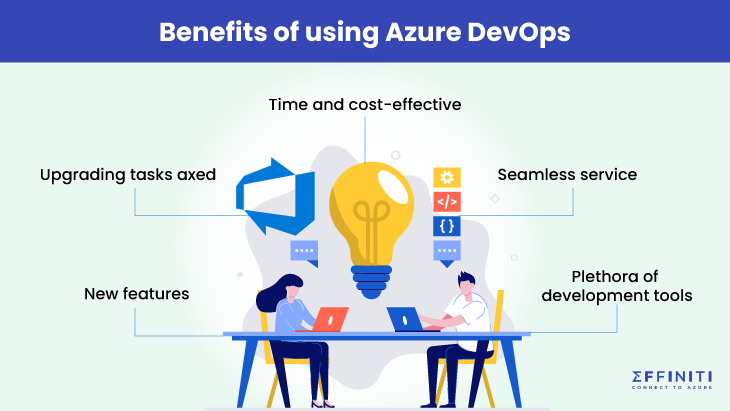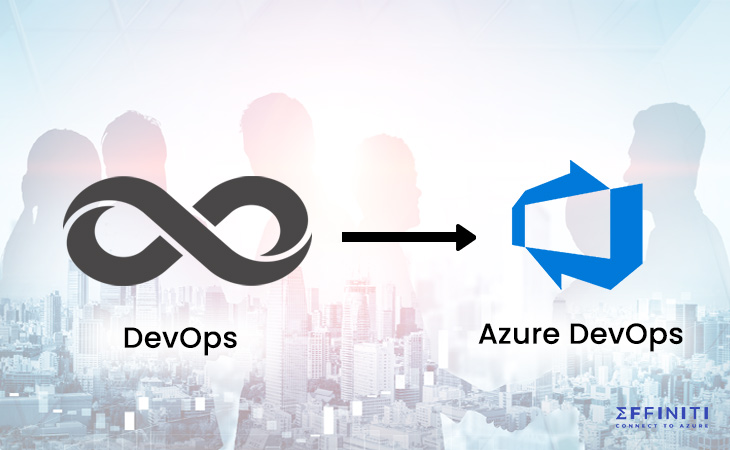Azure is experiencing exponential growth like never before. Thanks to its diverse service offerings and features, companies across the globe are choosing Azure over other cloud platforms. One such enviable offering is Azure DevOps.
For ages, the Development and Operations teams were at loggerheads due to the communication latency and various other issues. By fusing them as one team, companies cost-effectively achieve their IT goals.
Azure took a step further by doling out cloud-based DevOps solutions. The Azure DevOps powers the organizations to develop and maintain the applications faster and better. Offered as a Software as a Service (SaaS) model, Azure DevOps was formerly known as Visual Studio Team Services.
As the new name suggests, Microsoft’s dedicated service offers solutions from the planning stage to deployment to maintenance. Having realized its potential, most Fortune 500 have already integrated this offering into their solutions. So let’s have a look at what Azure DevOps is all about.
What features does Azure DevOps bring along?

Although there are many reasons why businesses choose Azure, the USP that drives the adoption of this cloud is the oceanic variety of productivity features. Azure DevOps comes with a heap of features by itself.
Azure Dashboard
Application development requires navigating through a myriad of tasks, which is a complex thing. However, Azure DevOps makes the navigation effortless with its Dashboard feature. Users can quickly hop from one section to another within a project. What’s more is that the users can customize the dashboard as per their preferences.
Azure Pipeline
Deliberate and refine your strategies to the maximum extent possible with Pipeline. The feature allows clients to hammer out their DevOps plans with the Continuous Integration and Continuous Deployment (CI/CD) pipeline. This Pipeline allows its users to build, test and deploy their apps efficiently. In addition, this feature enhances the cohesiveness of the Dev and Ops teams to formulate a convenient plan for both.
Immense support for testing
Azure DevOps supports testing on different modes, including manual, exploratory, and continuous testing. Additionally, the users can customize it and create real-time charts to track test activity. Finally, it can be programmed with the criteria that users want to test their solutions upon.
Azure Artifacts
Using this feature, the development team can securely stow away their codes and packages in this cloud. Then, the programmers can retrieve the code package easily and make the necessary changes suggested by the operations team.
Azure Monitor
The organization can glean off the metrics with the Azure Monitor Tool. The user can automate and configure the tool to monitor the organizational activities. The Ops team can advise the Dev team based on these vital metrics.
DevOps Wiki
Azure DevOps packs many more features. One of which is the Wiki feature. Wiki is a Hawaiian term that means ‘quick’. The Wiki feature allows DevOps members to access the project file anywhere, anytime. It also wicks away the requirement to apprise one another on the changes made to the project file. It is compatible with Windows, Mac, and Linux.
What are the benefits of using Azure DevOps?

Microsoft has left no stone unturned with Azure. Since its inception, Azure users have enjoyed a host of benefits. With an eye on productivity, Microsoft has garnished its DevOps service with various benefits.
New features
Microsoft makes no effort to be modest about its innovation. DevOps services are bettered every three weeks with the release of new features. This aspect has helped Azure gain traction in the cloud market.
Upgrading tasks axed
Azure has modeled DevOps as Software as a Service (SaaS). This effectively removes the added responsibility to watch out for any upgrades. Instead, the organization would only have to watch out for new features.
Time and cost-effective
By eliminating the barriers between the Dev and Ops teams, the expenses are reduced as the errors from both teams dwindle due to seamless communication. Also, Azure has the highest global presence, which allows you to select the server which is nearest to your location. This enables you to select and operate the DevOps server, which suits the law of the land and business requirements.
Seamless service
Azure DevOps is famous for its guarantee, where it promises its clients of 99.9% uptime. However, the downtimes issues of Azure DevOps are very lax, and the promise is explicated mentioned in Service Level Agreement (SLA). And Microsoft keeps the cloud tech running with its 24×7 support service.
Plethora of development tools
Being a Microsoft product is a boon to Azure. The Azure DevOps user has access to the tools of Microsoft. Ranging from Application Insights to Office 365, the user is empowered with tools that propel productivity. In addition, Microsoft’s global proliferation wicks away the compatibility concerns.
What are the competitive advantages of DevOps?

Having the edge over the competition is vital to a successful business venture. Azure goes the extra mile by offering industry-specific cloud solutions which help the respective clients achieve optimal results. Azure’s immense growth vindicates that it possesses a distinctive edge over its competitors. Let’s pit the Azure DevOps against some of its biggest contenders.
Jira
Originally designed to be a bug tracker, Jira has transcended to become a powerful productivity tool used across the world. Although it is one of the top-rated Application Lifecycle Management (ALM) tools, there is a growing consensus that there is scope for improvement. Users have encountered unexpected speed bumps in the form of problems. These hiccups cropped up in areas ranging from project administration to permissions. When pitted against Azure DevOps, users found it challenging to create lists of versions.
Jenkins
Jenkins primary strength is that it is open-sourced. It provides immense support for project development and deployment with its plug-ins offering. However, despite its best efforts, clients have experienced compatibility issues with the same. The users often have to come up with band-aid fixes to cauterize the compatibility issues. Given that it is open-sourced, there is a dearth of support for technical glitches. Azure DevOps outshines Jenkins on both fronts as its compatibility and 24×7 support have attracted users for ages now.
GitLab
Like Jenkins, Gitlab is an open-sourced DevOps lifecycle tool. However, this web-based tool gives Azure DevOps a run for its money as it matches the Microsoft cloud solution with its plethora of features. Gitlab and Azure have every crucial feature required to support DevOps production. However, Gitlab releases new features once every month while Azure DevOps doles out new features once every three weeks. Also, GitLab runs aground on its lax support towards fort test formats and integration with other extensions.
TFS
TFS is an ALM tool that packs various features to support DevOps. However, its dashboard is not as simple as Azure. Neither can be customized. Additionally, the interface for testing is relatively outdated. And to cap it off, TFS comes with a hefty price tag.
What promotes migration to Azure DevOps?

There are various reasons why people are becoming Azure DevOps users. Be it the new features, easy-to-use interface, or 24×7 support; Azure has made its mark in the cloud space arena. Occupying the second-biggest cloud market share, Azure is enticing DevOps users to opt for Azure DevOps.
But, what is promoting Azure DevOps adoption is the pay-as-you-model which is implemented on a minutely basis. This gives an edge over AWS as Amazon’s cloud implemented the pay-as-you-model on an hourly basis. Additionally, Azure is quite famous for its hybrid inclusive nature. Although AWS and GCP also sport hybrid support, Azure went out all the way to support hybrid infrastructure. Although these are finer aspects, they are not minor in any way.
Why Choose Effiniti as your Azure DevOps provider?

Effiniti provides Azure DevOps services to clients across all industries. A majority of Fortune 500 have harnessed our skillset. From the development to deployment, Effiniti optimizes the application lifecycle by erasing the requirement for traditional infrastructure. Armed with Azure, It allows you to unlock your potential. We observe your enterprise and sculpt a solution considering your business interests after due deliberation. Our clients enjoy 24×7 support and with our real-time monitoring, receiving valuable insights is a given. So reach out to us and reap the benefits that Azure comes abounding with.
More Articles:
- Why SME and Fortune 500 companies choose Azure Cloud Services?
- An In-Depth Comparison of Azure vs. Google Cloud vs. AWS Services
- The Biggest Azure Announcements at Microsoft Build 2021
- Top Business Benefits that Microsoft Azure Brings Along
- Top Reasons Why To Choose Azure Services For Your Enterprise
- Azure Automation 2020 recap and what’s new
- New to Azure? Follow these easy steps to get started

